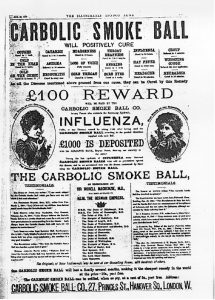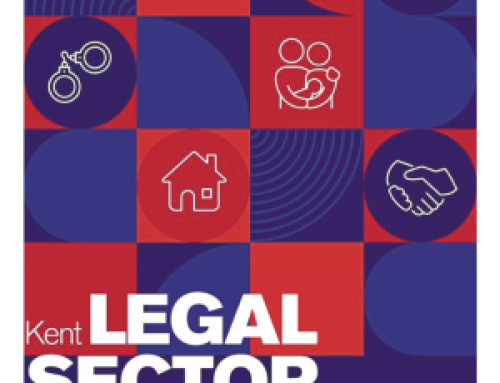Summary
Between 1889 and 1891, the influenza pandemic claimed the lives of approximately 1 million people worldwide.
During this time, a company by the name of Carbolic Smoke Ball Company (“the Defendant”) claimed that their product “the Carbolic Smoke Ball” (“the Product”) would prevent a person contracting influenza if used three times daily for two weeks.
The Defendant was so confident in the Product, that it placed an advert in the Pall Mall Gazette on 13 November 1890 stating that if any person used it and still contracted influenza, it would pay them £100 (which is the equivalent of £13,519.10 in 2021). The Defendant had deposited £1,000 in Alliance Bank for any pay outs as a result of the advert.
Ms Louisa Carlill (“the Claimant”), used the product three times daily from November 1891 to January 1892, when she contracted influenza.
The Defendant refused to pay the Claimant the advertised £100. The Claimant brought proceedings against the Defendant for breach of contract and was successful.
The Law
For a contract to be binding in England and Wales, five conditions must be met:
- Offer: there must be a valid and clear offer being made. A mere marketing puff or invitation to negotiate does not constitute a legal offer.
- Acceptance: there must be acceptance of the offer without any variation of the terms which has been communicated to the offeror.
- Consideration: there must be an exchange of value for the contract to exist. It does not need to be “adequate” but there must be a transfer of something of value. For example, the transfer of a car in exchange for £1.
- Intention to create legal relations: Both parties must have intended to create a legally binding contract.
- Certainty of terms: the terms of the contract must be clear, unambiguous and not lacking some essential term.
The five conditions above can be met verbally. An offer does not need to be formal and the terms do not necessarily be recorded in writing but the elements must exist in some form for a contract to exist and be legally binding.
 The Decision
The Decision
The Defendant appealed the initial decision on the basis that the advert was a mere marketing tool and did not amount to a legally binding contract. However, the court of appeal disagreed.
- Offer
The advert amounted to an offer to any person who used the Product in accordance with the instructions detailed in the advert. It was an advert to the world. This was evidenced by the fact that £1,000 had been deposited in Alliance Bank. It was not a “mere puff”.
- Acceptance
Whilst the Claimant did not communicate her acceptance of the offer to the Defendant, her conduct in meeting the conditions of treatment (i.e. using the Product three times a day for at least two weeks) and communicating her performance of such a condition is enough to constitute clear and communicated acceptance of the offer.
A useful analogy was provided by Bowen LJ on this point:
“If I advertise to the world that my dog is lost, and that anybody who brings the dog to a particular place will be paid some money, are all the police or other persons whose business it is to find lost dogs to be expected to sit down and write me a note saying that they have accepted my proposal? Why, of course, they at once look after the dog, and as soon as they find the dog they have performed the condition”
- Consideration
There is sufficient consideration as the advert was designed to attract the public to purchase the Product and increase public confidence in its effectiveness to increase sales and profit. The claimant purchased the Product as a result.
- Intention to create legal relations
The sum of £1,000 being deposited into Alliance Bank demonstrates that the Defendant’s offer was serious and it had an intention for it to be legally binding. The Claimant’s performance of the contract and subsequent notice of the same demonstrated her intention for the contract to be binding.
- Certainty
The Defendant claimed that the detailed within the advert were too vague to be a contract. The court considered what an ordinary member of the public might interpret from this advert and determined that it was not vague. That the offer, so long as it was not revoked, was ongoing whilst the Product was being used in accordance with the conditions.
The Defendant’s appeal was dismissed and it was concluded by Lindley LJ that:
“… the defendants must perform their promise, and, if they have been so unwary as to expose themselves to a great many actions, so much the worse for them.”
Case Details
| Type: | Contract Law |
| Court: | Court of Appeal |
| Claimant: | Louisa Carlill |
| Defendant: | Carbolic Smoke Ball Company |
| Claim amount: | £100 (the equivalent of £13,519.10 in 2021) |
| Claim summary: | Breach of contract |
Griffin Law is a dispute resolution firm comprising innovative, proactive, tenacious and commercially-minded lawyers. We pride ourselves on our close client relationships, which are uniquely enhanced by our transparent fee guarantee and a commitment to share the risks of litigation. If you have any specific questions regarding a dispute, please email justice@griffin.law or call 01732 52 59 23.
GRIFFIN LAW – TRANSPARENT FEES. TENACIOUS LAWYERS. TRUSTED PARTNERS.
Nothing in this document constitutes any form of legal advice upon which any person can place any form of reliance of any kind whatsoever. We expressly disclaim, and you hereby irrevocably agree to waive, all or any liability of any kind whatsoever, whether in contract, tort or otherwise, to you or any other person who may read or otherwise come to learn of anything covered or referred to in this document. In the event that you wish to take any action in connection with the subject matter of this document, you should obtain legal advice before doing so.
© Griffin Law Limited, 2021. All rights reserved.





